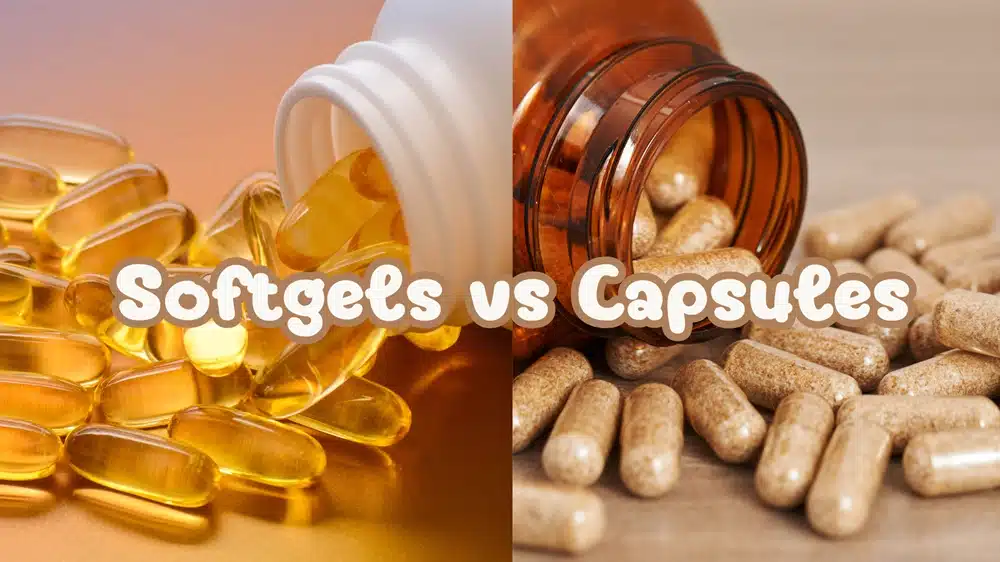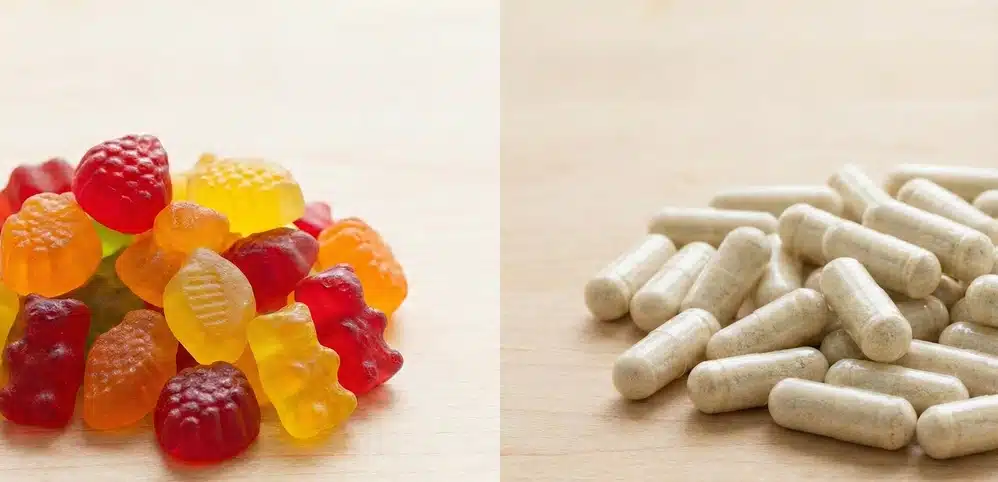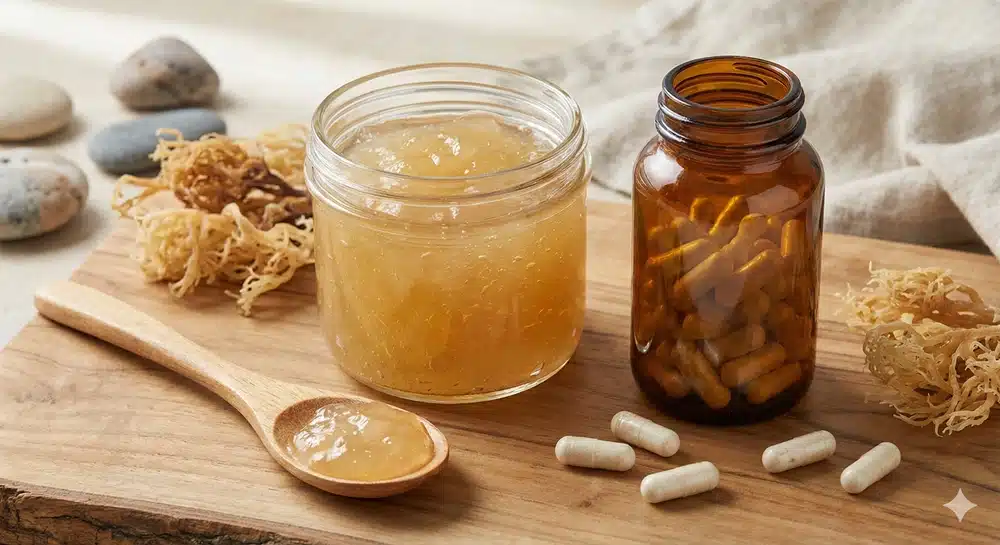あなたはサプリメントの売り場で、まったく同じ栄養素のボトルを2本見つめている。同じ用量、同じブランド、同じような価格。しかし、1つだけ小さな違いがある。ここでは、最初の重要な違いのコンテンツを、紹介文にマッチした魅力的でSEOに適したスタイルで書いています。.
どれを選んでもいいのだろうか?

答えはこうだ。 はい. .サプリメントがどのような形をしているかは、単に パッケージング-栄養素の吸収率、飲みやすさ、有効成分の安定性などに直接影響します。間違ったものを選ぶと、せっかくのサプリメントから十分な効果を得られないことになりかねません。.
について ソフトジェルとカプセルの比較 ディベートは混乱しがちですが、その必要はありません。この明確でシンプルな2025年ガイドでは、以下のことを説明する。 5つの重要な違い を紹介する。最後には、それぞれの特徴を正確に理解し、自分の健康目標にぴったりのものを自信を持って選べるようになるはずだ。.
主な違い1:内部のコンテンツ
ソフトジェルとカプセルの最も基本的な違いは、何を入れるために設計されているかにある。ソフトジェルとカプセルは、それぞれ特定の種類の成分のために設計された、特殊な容器だと考えてください。.
ソフトジェル液体と油の達人
ソフトジェル は、オイルやその他の液体または脂溶性の栄養素に理想的な選択肢です。その構造は、空気や酸化から内容物を保護する単一の密閉されたゼラチン・シェルから成っている。このため、酸素に触れると劣化する可能性のある繊細な化合物には最適です。.
内部の有効成分は、多くの場合、オイルキャリアにあらかじめ溶解されている。.
といった栄養素に最適だ:
- フィッシュオイル(オメガ3系)
- ビタミンD
- ビタミンE
- コエンザイムQ10 (CoQ10)
- 月見草 オイル
カプセル粉末の力
伝統的なハード カプセル, 一方、乾燥した粉末原料を入れるように設計されている。粉末を包む2つの部品(「キャップ」と「ボディ」)から構成されている。この形状は非常に汎用性が高く、メーカーはさまざまなハーブ、ビタミン、ミネラルを一度に正確にブレンドすることができる。.
といった栄養素に最適だ:
- プロバイオティクス
- ハーブブレンド(ターメリック、アシュワガンダ、ミルクシスルなど)
- ほとんどのミネラル(マグネシウムや亜鉛など)
- ビタミンB群
| 特徴 | ソフトジェル | カプセル |
| 主要コンテンツ | 液体、オイル、ジェル | 粉末、顆粒 |
| 最適 | フィッシュオイル、ビタミンE、CoQ10 | プロバイオティクス、ハーブブレンド、ビタミンB群 |
相違点2:シェルの組成と構造
中身だけでなく、殻そのものの物理的なデザインや素材も大きな違いとなり、保存期間からサプリメントの摂取方法まで、すべてに影響する。.
ソフトジェルシームレスなワンピース・シェル
液体で満たされた小さくて柔軟な風船を想像してください。ゼラチン(またはカラギーナンのような植物由来の代替品)でできた密封された一片が、液体充填物を完全に包み込んでいるのだ。.
この継ぎ目のないデザインは、ソフトジェルの気密性を高めます。これは、フィッシュオイルやビタミンEのようなデリケートなオイルを酸化から守るための大きな利点です。酸素をシャットアウトすることで、ソフトジェルは中の栄養素の効能と鮮度を保ち、より長く安定した保存期間につながります。.
カプセルツーピース・デザイン
ハードカプセルは、粉末を入れる小さめの「ボディ」と、その上をスライドさせて密閉容器を作る大きめの「キャップ」という、古典的でわかりやすい構造をしている。.
このツーピース・デザインには、1つのユニークで重要な利点がある。錠剤を飲み込むのが苦手な人にとって、これは画期的なことだ。カプセルを軽くひねって引き離せば、粉末の中身をスムージーやヨーグルト、アップルソースに混ぜることができ、より簡単に摂取できる。この柔軟性が、多くの 粉末サプリメント, 特に子供や高齢者向けには、カプセルの形をしたものがある。.
主な違い3:吸収とバイオアベイラビリティ
これは、消費者にとって最も重要な要素であることが多い。サプリメントを摂取することと、実際に体に吸収され、効果的に利用されることとは別のことです。ここで、中身の物理的形状が大きな役割を果たす。.
ソフトジェル素早く吸収されるように設計
ソフトジェルの第一の利点は、その液体の中心にある。. 有効成分はすでにオイルに溶けているか懸濁しているので、殻が溶けた後、体はほとんどすぐに有効成分に取り掛かることができる。. そのため、吸収が早く、効率的であることが多い。.
これは、特に次のような場合に重要である。 脂溶性 ビタミンA、D、E、Kなどの栄養素、CoQ10やオメガ3脂肪酸などの化合物。. これらの栄養素が適切に吸収されるためには脂肪が必要であり、ソフトジェルは必要なオイルキャリアと一緒にあらかじめパッケージされた栄養素を提供する。.
これは、より高いコストにつながる。 バイオアベイラビリティ, これは科学用語で、血流に入って活性効果を発揮する栄養素の割合を示す。. あらかじめ中身が溶けたソフトジェルは、バイオアベイラビリティに優れ、より早く、より強力な影響を与えると考えられている。.
カプセル二段階のプロセス
硬いカプセルを飲み込むと、消化器官には2つの仕事がある。まず、カプセルの外殻を分解する。. 第二に、栄養素が血流に吸収される前に、中の圧縮された粉末を溶かさなければならない。.
この2段階のプロセスは、当然、ソフトジェルに比べて吸収が遅く、安定しないこともある。. 最近のカプセルは効率よく溶けるように設計されていますが、胃のpHや食べ物の有無などの要因は、粉末成分が体内で利用できるようになるまでの時間に影響します。.
多くの水溶性ビタミンやミネラルは、この製法で完璧に摂取できる。しかし、できるだけ早く摂取したい場合や、油性の栄養素を最も効率よく吸収したい場合には、ソフトジェルが明らかに有利な場合が多い。.
主な違い4:飲み込みやすさと体感
サプリメントの体感は、日常生活に大きな違いをもたらす。多くの人にとって、錠剤は飲みやすく快適であればあるほど、継続的に服用する可能性が高くなる。.
ソフトジェル滑らかでしなやか
錠剤を飲み込むのが難しいという人には、ソフトジェルが向いている。ソフトジェルの特徴は、表面が滑らかで柔軟性があり、しばしば滑るため、水を一口飲むだけで簡単にのどを通り抜けることができることだ。.
さらに、その気密性の高いシームレスなデザインは、以下の点で非常に優れている。 不快な味と臭いのマスキング. .これは、魚油のような刺激的な味を持ち、“魚のゲップ ”につながる可能性のあるサプリメントにとって、非常に大きな利点である。ソフトジェルは、味覚を通過して胃の中に入るまで、効果的にオイルを閉じ込め、より快適な体験を作り出します。.
カプセル軽いが時に “ベタつく”
ハードカプセルは一般的に軽量で、ほとんどの人にとって飲み込みやすい。しかし、食感は異なります。個人によっては、ゼラチンやベジキャップの素材が、十分な液体と一緒に飲まないと、舌や喉の奥に一瞬くっつくように感じることがある。.
ポジティブな面では、カプセルは完全である。 無味無臭. .また、前述したように、錠剤を飲み込むことが本当にできない人にとって、錠剤を引き離して粉末を食べ物に混ぜることができるのは、単にソフトジェルでは提供できない無敵の機能である。.
主な相違点5:コスト、安定性、食事への配慮
サプリメントの核となる機能だけでなく、価格、保存期間、成分といった実用的な要素も、最終的な決め手となり得ます。ここでは、ソフトジェルとカプセルが、これらの重要な分野でどのような位置づけにあるかを紹介する。.
製造とコスト
一般的に言って、ソフトジェルの製造工程はハードカプセルの充填よりも複雑で、より専門的な機械を必要とする。継ぎ目のないシェルに液体を封入するのは、繊細な技術的プロセスである。このため、製造コストが高くなる、, ソフトジェルは若干割高になることがある 同じ成分をカプセルにしたものよりも、消費者にとってお得です。常にそうであるとは限りませんが、2つの同じ製品を比較する場合、カプセルの方が予算に見合った選択肢であることがよくあります。.
安定性と保存性
どちらの形も安定するように設計されているが、環境の弱点が異なる:
- ソフトジェルは熱に弱い。. フィッシュオイル・ソフトジェルのボトルを暑い車内や日当たりの良い窓辺に置いておくと、戻ってきたときにベタベタした塊がひとつ見つかるかもしれません。しかし、魚油ソフトジェルは密閉性が高いため、次のような問題から身を守ることができる。 酸化, 繊細なオイルの鮮度を保つのに理想的である。.
- カプセルは湿度に弱い。. 非常に湿度の高い環境では、ゼラチンやベジキャップの殻が湿気を吸収し、ベタベタしたり、中の粉末の完全性が損なわれたりする可能性がある。逆に、非常に乾燥した環境では、もろくなる可能性がある。.
食事オプション(ビーガン/ベジタリアン)
これは、2025年の多くの消費者にとって重要なポイントである。歴史的に、ソフトジェルとカプセルはどちらも動物由来のゼラチン(通常はウシまたはブタ由来)から作られていたため、ベジタリアンやビーガンには不向きだった。.
幸いなことに、この業界は大きく進化している:
- ビーガンのカプセル: 植物性カプセルは、一般にこう呼ばれている。 “ベジキャップ” が広く出回っている。HPMC(ヒドロキシプロピルメチルセルロース)という植物セルロースから作られたものが一般的で、植物由来のライフスタイルを実践している人には最適だ。.
- ビーガン・ソフトジェル: 植物由来のソフトジェルを作るのはより困難だったが、現在では一般的な方法となっている。これらは通常、変性デンプン、カラギーナン(海藻由来)、グリセリンのような可塑剤から作られ、従来のゼラチンと同様の性能を持つ殻を作る。.
結論はこうだ: かつては、ビーガンであることを保証するためにカプセルを選ぶしかなかったが、現在ではどちらの形態でも優れた植物性バージョンが容易に入手できるようになった。重要なのは ラベルの「その他の成分」の欄を必ず確認すること。 確かにそうだ。.
ソフトジェルとカプセル:比較表
| 特徴 | ソフトジェル | カプセル |
|---|---|---|
| コンテンツの種類 | 液体、オイル、ジェル | 粉末、顆粒、ビーズ |
| 最適 | フィッシュオイル、ビタミンD、CoQ10 | プロバイオティクス、ハーブブレンド、ミネラル |
| 吸収率 | 一般的に速い(溶解前) | より遅い(粉末溶解が必要) |
| 飲み込みやすさ | 非常に簡単(滑らかでしなやか) | 概して容易(「べたつき」を感じることがある) |
| 開けられるか? | ✗ なし(密閉式) | ✓ はい(ツーピース・デザイン) |
| ビーガンオプション | ✓ 幅広く利用可能 | ✓ 幅広く入手可能(ベジキャップ) |
| 味/臭いのマスキング | 素晴らしい | うまい(中身は不味い) |
| 熱に弱い | 高い(溶けたりくっついたりする) | 低い |
結論2025年、あなたはどちらを選ぶべきか?
サプリメントの売り場を回るのは、当てずっぽうのゲームではありません。これまで見てきたように、ソフトジェルとカプセルのどちらを選ぶかは任意ではなく、栄養素の種類、体のニーズ、個人の好みに基づいて決めるものです。どちらの形態も効果的ですが、それぞれに明確な利点があります。.
2025年のあなたの健康のために最良の選択をするための簡単なガイドです。.
ソフトジェルを選ぶなら
- 油性または脂溶性の栄養素を摂取している 魚油(オメガ3系)、ビタミンD、ビタミンE、CoQ10などである。.
- 最速の吸収を優先する 特に液状のものについては、生物学的利用能が最大となる。.
- 錠剤を飲み込むのが難しい そして、“引っかかる ”ことのない、滑らかで滑りやすいテクスチャーを好む。”
- 不快な味や臭いを避けたい これはフィッシュオイルにとって重要な利点である)。.
カプセルを選ぶなら
- あなたは取っている 粉末サプリメント, プロバイオティクス、ハーブのブレンド(ターメリックなど)、ミネラルなど。.
- 錠剤を飲み込むのに苦労している また、錠剤を開けて中身を食べ物や飲み物に混ぜる柔軟性を求めている。.
- 最も費用対効果の高い選択肢を探している、, カプセルの方がわずかに製造コストが安いこともあるからだ。.
- 熱に弱いサプリメントが必要だ、, 温暖な気候に住んでいるならなおさらだ。.
結局のところ、「最良の」選択肢は一つではなく、最良の選択肢しかない。 あなたへ. .素晴らしいニュースは、どちらの形態でも製造が非常に進んでいるため、高品質で効果的、かつダイエットに適した選択肢を見つけることができるということだ。この知識を身につければ、ラベルにとらわれず、自分の健康目標を真にサポートするために、十分な情報を得た上で決断することができる。.
参考文献
- バイオアベイラビリティの向上(重要な相違点3): https://www.ncbi.nlm.nih.gov/pmc/articles/PMC2852504/
- 患者の嗜好と飲み込みやすさのために: https://pmc.ncbi.nlm.nih.gov/articles/PMC8900010/


